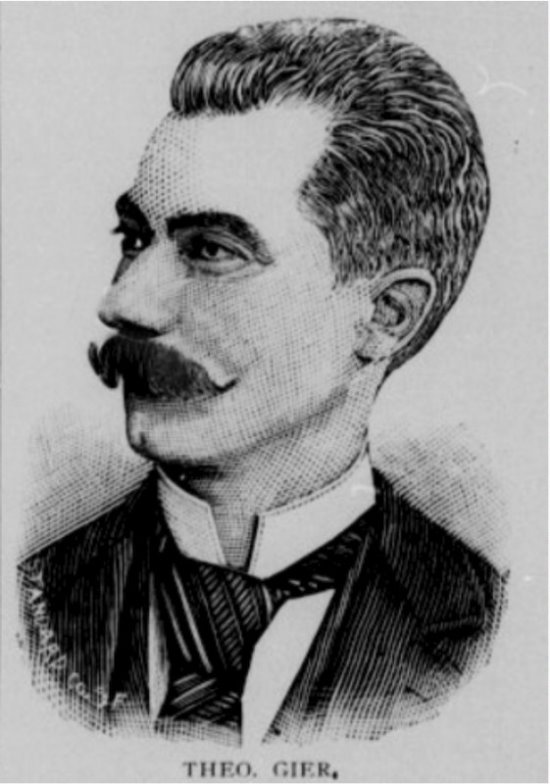
| ||||||
In 1879, John Olive inherited a ranch that produced, you guessed it, fish. Folks would take the dirt road in from Oakland that passed along the front of his trout enterprise. He built a little community there which included a stage coach station, guest cottages and a saloon. Word spread that his wife was an excellent cook and visitors would stop in for one of her savory meals. Their venture became so popular that the dirt road was officially named Fish Ranch Road. Olive was considered to be a good judge of horse flesh, and his property also provided cattle corrals, a stable and his expertise in horse trading. He died in 1897, due to a horse-related accident.
Olive's widow and two daughters, Ella and Rose, continued to run the business along with their husbands. Ella was married to Gabriel Y. Moraga, a grandson of Joaquin Moraga. They ran the saloon at Fish Ranch Road. A Contra Costa County Supervisors meeting agenda dated April 3, 1899, acknowledges liquor licenses granted to several hotels and saloons in the county. On the list is: Moraga G. Y., Fish Ranch Saloon, Fish Ranch. The agenda is faded, but for the most part reads, "It is ordered that the License Tax Collector issues licenses to sell spirituous malt-fermented and intoxicating liquors and wines in quantities less than one quart to the following named persons and the following named places to wit."
It is during this time that Gier had already begun the early stages of his liquor and wine dealership, which he established in 1892, called Theo. Gier Company. His business headquarters were in two Oakland, California locations.
Gier's heart was in winemaking, but as the owner of a grocery store he noticed that the sale of hard liquor was more profitable. Choosing to amass a tidy sum, he began to sell his flagship brand, "Metropole Whiskey." This decision helped him to bankroll the money he needed to buy vineyards in Alameda County. In 1893, he purchased one in Livermore, followed by one in Napa in 1898, a second one in Livermore in 1901, and another vineyard in St. Helena in 1903.
The following year, Gier took up residence locally, according to a copy of the 1904 lease agreement between Gabriel and Ella Moraga (the party of the first part) and Gier (the party of the second part): "That certain road house known as the `Fish Ranch Road House' and its surroundings, situated on the County Road between Oakland, Alameda County, California, and Lafayette, Contra Costa County, California, and formerly known as the `John Olive Ranch,' consisting of 15 acres of land, together with a residence and out buildings, and all furniture therein, and including also two cottages and pleasure grove and trees situated thereon; (save and excepting therefrom one cow barn and back shed and back Corral), with the appurtenances, for the term of four and one-half years from the first day of May, one thousand nine hundred and four, at the monthly rent or sum of Fifty (50) Dollars, payable in Gold coin of the United States of America, payable in advance on the first day of each and every month during said term."
It was at this time, however, that Gier was about to see a dramatic downfall with his popularity and his fortune.
During the Boxer Rebellion (an uprising against foreigners that occurred in China about 1900), Gier made contributions to the international forces. In 1903, Germany's Kaiser Wilhelm honored Gier with the Order of the Crown. When World War I broke out, the Kaiser became America's enemy. A business competitor of Gier's had accused him and others at a 1918 wine-makers function of toasting the Kaiser and singing German patriotic songs. Newspapers reported that Gier was jailed and later made to kneel and kiss the American flag. Although the charges were never made official, the damage was done.
In order to avoid further harm to his reputation, Gier placed an ad in the Oakland Tribune with the headline: "I Am Not Pro-German!" The ad went on to state, "If the Kaiser should triumph, civilization would be endangered." Unfortunately, it was too little, too late as Gier saw himself removed from several state and county boards.
By the time 1920 rolled in, Gier had already been involved with several anti-Prohibition legal transgressions, most of which he was innocent. Besides short stints in jail, his vineyards (which would have been worth $20 million today) were confiscated, and over 20,000 gallons from his Napa distillery were dumped into a sewer by authorities. After liquidating the rest of his property, Gier sold his Napa vineyard to The Christian Brothers for only $50,000 ($10,000 of it was in cash). He later purchased a 180-acre orange grove near San Jose that never thrived due to frost conditions.
With his fortune nearly depleted, Gier, who had recovered from a heart attack years before, grew increasingly despondent over events. Although there exists no real proof, some reports say that his descendants were convinced he committed suicide by ingesting small amounts poison over a lengthy period of time. He passed away in 1931, at the age of 70, at his home in Piedmont, California.
Special thanks to Moraga Historical Society president Susan Sperry.
Reach the reporter at:
